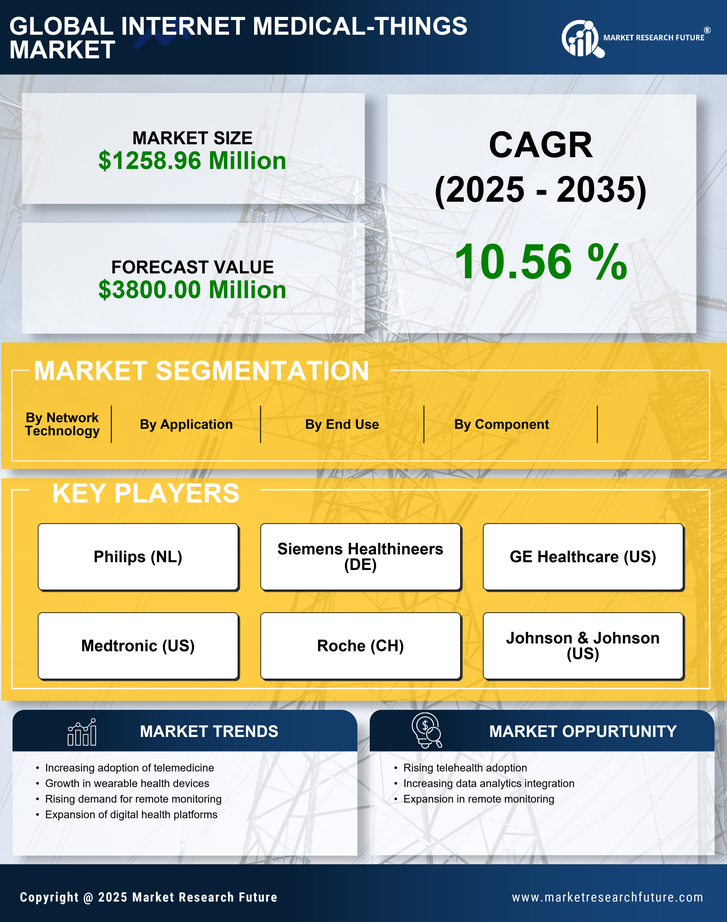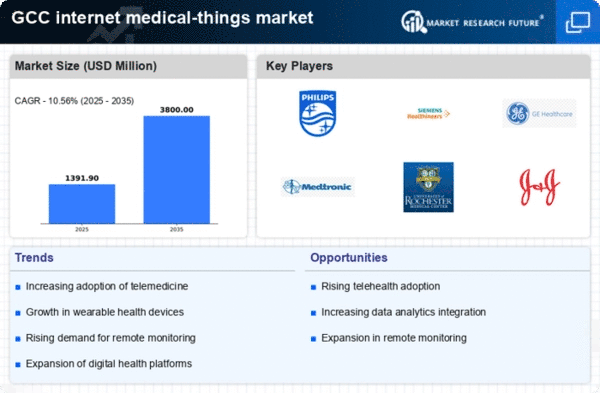Government Initiatives and Support
Government initiatives aimed at enhancing healthcare infrastructure in the GCC are significantly influencing the internet medical-things market. Various national health strategies are being implemented to promote digital health solutions, including telemedicine and health informatics. For instance, the Saudi Vision 2030 plan emphasizes the integration of technology in healthcare, which is expected to boost the adoption of internet medical-things solutions. Furthermore, funding and incentives for startups in the digital health sector are likely to foster innovation and expand the market. As governments continue to prioritize health technology, the internet medical-things market is poised for substantial growth.
Increased Health Awareness Among Consumers
There is a growing awareness of health and wellness among consumers in the GCC, which is positively impacting the internet medical-things market. As individuals become more health-conscious, they are increasingly seeking tools that facilitate better health management. This trend is reflected in the rising sales of wearable health devices, which have seen a growth rate of approximately 15% annually in the region. Consumers are now more inclined to utilize internet medical-things solutions to monitor their health metrics, leading to a broader acceptance of digital health technologies. This shift in consumer behavior is likely to drive further innovation and investment in the market.
Rising Demand for Remote Patient Monitoring
The internet medical-things market is experiencing a notable surge in demand for remote patient monitoring solutions. This trend is driven by the increasing prevalence of chronic diseases in the GCC region, which necessitates continuous health monitoring. According to recent data, approximately 30% of the population in GCC countries suffers from chronic conditions, leading to a heightened need for effective management tools. Remote monitoring devices enable healthcare providers to track patients' vital signs in real-time, facilitating timely interventions. This shift towards proactive healthcare management is likely to enhance patient outcomes and reduce hospital readmissions, thereby driving growth in the internet medical-things market.
Growing Investment in Digital Health Startups
Investment in digital health startups is rapidly increasing in the GCC, which is significantly impacting the internet medical-things market. Venture capital funding for health tech companies has surged, with investments reaching over $500 million in the past year alone. This influx of capital is fostering innovation and enabling startups to develop cutting-edge solutions that address various healthcare challenges. As these startups introduce new technologies and services, they are likely to enhance the overall landscape of the internet medical-things market. The competitive environment created by these investments may also lead to improved offerings for consumers and healthcare providers alike.
Technological Advancements in Medical Devices
Technological advancements in medical devices are playing a crucial role in shaping the internet medical-things market. Innovations such as improved connectivity, enhanced data analytics, and the development of user-friendly interfaces are making medical devices more accessible and effective. For example, the integration of IoT technology in medical devices allows for seamless data transmission and real-time monitoring. This evolution is expected to attract more healthcare providers and patients to adopt internet medical-things solutions. As technology continues to advance, the market is likely to witness an influx of new products and services that cater to the evolving needs of healthcare.

















